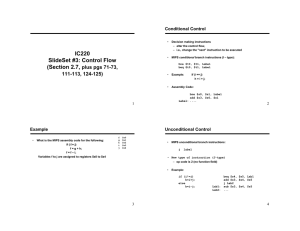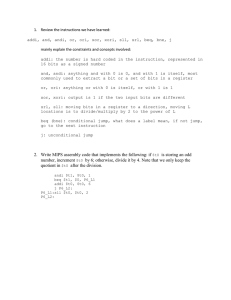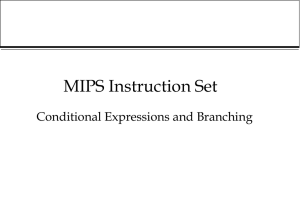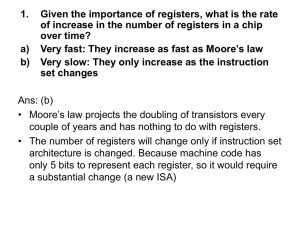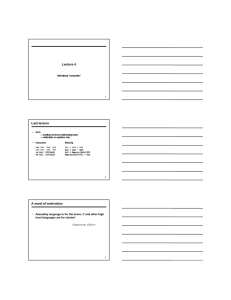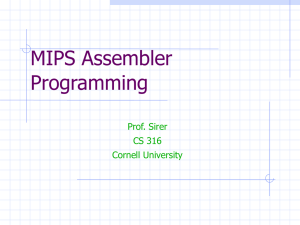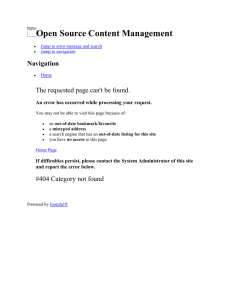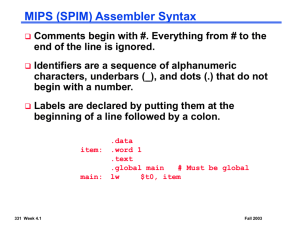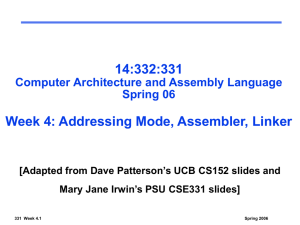s1 = $s2
advertisement
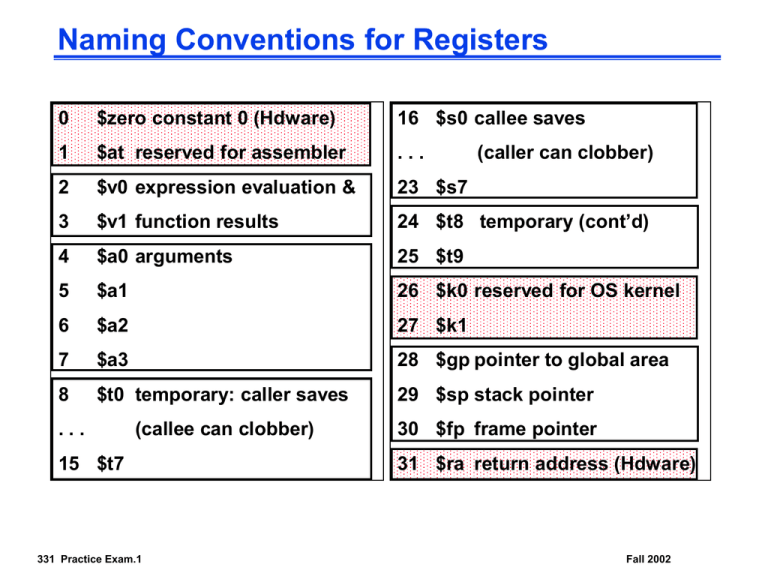
Naming Conventions for Registers 0 $zero constant 0 (Hdware) 16 $s0 callee saves 1 $at reserved for assembler ... 2 $v0 expression evaluation & 23 $s7 3 $v1 function results 24 $t8 temporary (cont’d) 4 $a0 arguments 25 $t9 5 $a1 26 $k0 reserved for OS kernel 6 $a2 27 $k1 7 $a3 28 $gp pointer to global area 8 $t0 temporary: caller saves 29 $sp stack pointer (callee can clobber) 30 $fp frame pointer ... 15 $t7 331 Practice Exam.1 (caller can clobber) 31 $ra return address (Hdware) Fall 2002 Review: MIPS ISA, so far Category Instr Op Code Example Meaning Arithmetic add 0 and 32 add $s1, $s2, $s3 $s1 = $s2 + $s3 (R & I format) subtract 0 and 34 sub $s1, $s2, $s3 $s1 = $s2 - $s3 add immediate 8 addi $s1, $s2, 6 $s1 = $s2 + 6 or immediate 13 ori $s1, $s2, 6 $s1 = $s2 v 6 Data Transfer load word 35 lw $s1, 24($s2) $s1 = Memory($s2+24) store word 43 sw $s1, 24($s2) Memory($s2+24) = $s1 (I format) load byte 32 lb $s1, 25($s2) $s1 = Memory($s2+25) store byte 40 sb $s1, 25($s2) Memory($s2+25) = $s1 load upper imm 15 lui $s1, 6 $s1 = 6 * 216 br on equal 4 beq $s1, $s2, L if ($s1==$s2) go to L br on not equal 5 bne $s1, $s2, L if ($s1 !=$s2) go to L set on less than 0 and 42 slt if ($s2<$s3) $s1=1 else $s1=0 set on less than immediate 10 slti $s1, $s2, 6 if ($s2<6) $s1=1 else $s1=0 jump 2 j 2500 go to 10000 jump register 0 and 8 jr $t1 go to $t1 jump and link 3 jal 2500 go to 10000; $ra=PC+4 Cond. Branch &R format) (I Uncond. Jump (J &R format) 331 Practice Exam.2 $s1, $s2, $s3 Fall 2002 Question I: Assume that memory has 232 addressable locations, and MIPS is 32-bit architecture. Please specify the width of the following address and data lines between the processor and the memory. read addr/ write addr Processor read data Memory 232 Addressable locations write data 331 Practice Exam.3 Fall 2002 Question II: Question 3.10 on page 199 (PH text book) Question 3.5 on page 198 (PH text book) 331 Practice Exam.4 Fall 2002 Question III: What if the branch destination is further away than can be captured in 16 bits? What can the assembler do to alleviate this problem? beq 331 Practice Exam.5 $s0, $s1, L1 Fall 2002 Question IV: Give the machine code for the following assembly code segment: (you may use the combination of decimal, hexidecima, and/or binary encodings.) 0x00400040 Loop: add $t1, $s3, $s3 add $t1, $t1, $t1 add $t1, $t1, $s6 lw $t0, 0($t1) bne $t0, $s5, Exit add $s3, $s3, $s4 j Loop Exit: 331 Practice Exam.6 Fall 2002
